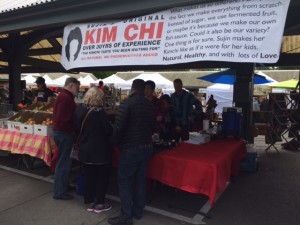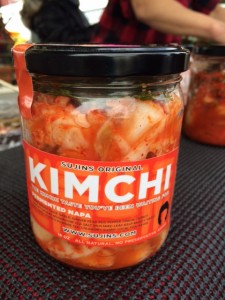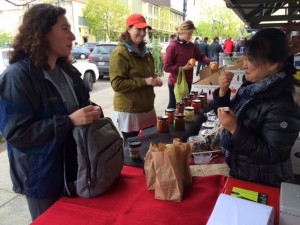
Submitted by Mary Vermillion for Bellingham Farmers Market
Across America, in home kitchens and high-end restaurants, cooks are exploring the health benefits of kombucha, kefir, sauerkraut, kimchi and other fermented foods. Loaded with probiotics, fermented food — an age-old method of food preservation — encourages good bacteria that may improve digestion and overall health. Interested in learning more? Sujin’s Kimchi at the Bellingham Farmers Market is a great place to start your fermented foods education.
Like the kimchi she makes, Sujin Jo had been biding her time, letting ferment the idea of bottling and selling the recipes she learned from her mother and grandmother as a young girl in Korea. A year ago, she told her son, Brian, it was time to go public. “It was her dream to share her Korean cooking with others,” Brian says. Brian, his dad and sister help with chopping vegetables — Kimchi means fermented vegetables in Korean — and prepping, but he says, “My mother has all of those recipes locked away in her brain. She makes the magic happen.”

It has been a magical start for the business. Thanks to community support, in one year, they’ve gone from a single stand at the Anacortes Farmers Market to a second location at the Bellingham Farmers Market. They also sell Sujin’s kimchi at their family’s Japanese restaurant in Anacortes. A further sign of success, they’ve upgraded packaging from PET1 plastic to glass jars; each sells for $14 and features a distinctive logo designed by Brian’s sister. “I wanted to let people know this was made by just normal people and it was my mother who created the kimchi,” says Brian, describing the logo, which is an outline of his mother’s head and long, dark hair. “I knew she would be too shy to put her face in it, but the hair was mysterious enough when people saw the label and then her, they could go, ‘Wait, is that you?!’”
Customers definitely notice the difference in his mother’s kimchi, Brian says. He credits quality ingredients such as homemade fish sauce from local seafood, including spot prawns from Jones Family Farms on Lopez. The family sweetens their kimchi with fermented pears and apples from local orchards rather than sugar. Brian and his mother regularly shop neighboring stands at the close of market, buying what didn’t sell. “We don’t need perfect vegetables,” Brian explains. And they use everything, including the greens.

They take the vegetables back to their Anacortes restaurant where they blend ingredients then stack clay, ceramic or plastic containers of the fermenting vegetables in special refrigerators that regulate the temperature depending on the type of vegetable and fermentation process.
The Jo family makes more than 60 varieties of kimchi and features 10 to 15 different seasonal styles each week at their market stand. Popular varieties include cabbage rabe, Jerusalem artichoke, jalapeño or cucumber. While each is a bit different, there are shared characteristics — the snap of perfectly fermented vegetables and an addictive blend of sweet, sour and spicy. Watching a customer bite into a sample, Sujin compares the carbonated fizz and pop of fermented vegetables to 7-Up.
Many of the Jo’s customers say eating daily doses of Sujin’s kimchi helps with Chron’s Disease and other health issues. And the Jos eagerly share how fermented foods can be part of a healthy lifestyle. “We have been taught that bugs are bad, germs are bad, and dirt is dirty, but for us it is a little different. For us there is a duality to life; if there are bad bacteria then there has to be good bacteria,” Brian says. “Fermentation offers a lot, especially when it comes to good bacteria, lactobacillus. Whether you’re having yogurt, kefir, kraut, or kimchi, your gut — where most diseases start — will be strengthened with the introduction of those good bacteria. I highly recommend looking at the benefits, and you would be amazed at how the bacteria are so necessary for us.”
Because kimchi can be a new taste experience for many customers, Brian encourages adding it to familiar Western dishes. “There are spicy, sour, sweet, and non-spicy kimchi and each one complements different ones,” he says. “Seafood goes well with the non-spicy, while meats are good with spicy ones. Cooking kimchi unlocks a different taste in the vegetables, and you get different nutrients then, too. Put them in between your sandwiches, toss them in salads, mince them up to stir fry, or dump the whole container to boil, add some ingredients to make a stew! The sauce is where it is at!”

Through their market stand, the Jos are winning converts and connecting with the kimchi faithful. On a recent Saturday, Doniki Boderick-Luckey of Bellingham was at Sujin’s when the market bell rang. “I was lying in bed this morning. I wanted to go to the market, but I didn’t want to get up,” she says. “Then I went online and saw they were here. That did it.” Boderick-Luckey, who is half Korean, grew up with kimchi. While she calls it her “soul food,” she understands many Americans have a psychological barrier to fermented vegetables. “Many people think: fermented, ugh. But, it’s sauerkraut, spicy sauerkraut. Get over it,” she says while cradling jars of Sujin’s cabbage rabe and leek kimchi.
The response is gratifying to Sujin. “When I first started, I was nervous,” she says. “I thought it might be too spicy for people. Now, they are coming back week after week,” to sample, buy different styles and to learn more about kimchi.
Want to try more fermented food styles? Visit June Bug, another new vendor at the Bellingham Farmers Market. Owner Kirsti McGuire makes and sells sauerkraut, beet and fruit kvass (a fizzy tonic) and other raw, living probiotic foods. Learn more about the Bellingham Farmers Market at bellinghamfarmers.org.








































